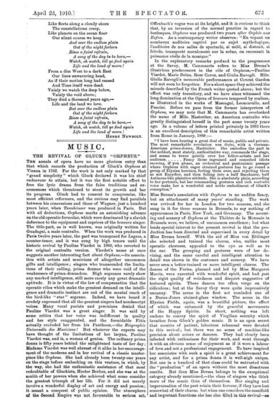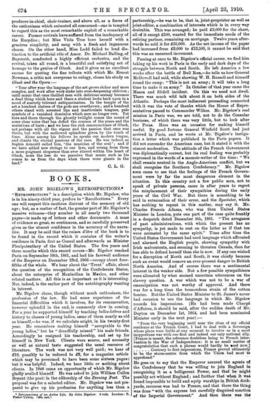MU S IC.
THE REVIVAL OF GLUCK'S " ORPHEUS." THE annals of opera have no more glorious entry than that which records the production of Gluck's Orpheus at Vienna in 1762. For the work is not only marked by that "grand simplicity" which Gluck declared it was his chief endeavour to attain, but it was the first notable effort to free the lyric drama from the false traditions and ex- crescences which threatened to stunt its growth and bar its progress. Gluck had to consent to compromise, like most efficient reformers, and the curious may find parallels between his concessions and those of Wagner, just a hundred years later, when Tannhauser was produced in Paris. But with all deductions, Orpheus marks an astonishing advance on the old operatic formulae, which were dominated by a slavish deference to the equipment and caprices of the bravura singer. The title-part, as is well known, was originally written for Guadagni, a male contralto. When the work was produced in Paris twelve years later, the part was transposed for Legros, a counter-tenor, and it was sung by high tenors until the historic revival by Pauline Viardot in 1860, who reverted to the original contralto version. Viardot's name at once suggests another interesting fact about Orpheus,—its associa- tion with artists and musicians of altogether uncommon gifts and intelligence ; singers who transcended the limita- tions of their calling, prima donnas who were void of the weaknesses of prima-donnadom. High sopranos rarely show any marked intelligence, still more rarely any great dramatic aptitude. It is in virtue of the law of compensation that the operatic roles which make the greatest demand on the intelli- gence and dramatic instinct are out of the mental reach of the bird-like " star " soprano. Indeed, we have heard it crudely expressed that all the greatest singers had nondescript voices. Many vocal purists and precisions denied that Pauline Viardot was a great singer. It was said by some critics that her voice was indifferent in quality and her style exaggerated, and the formidable Fetis actually excluded her from his Pantheon,—the Biographie Universelle des lifusiciens ! But whatever the experts may have thought of the limitations of her larynx, Pauline Viardot was, and is, a woman of genius. The ordinary prima donna is fifty years behind the enlightened taste of her day ; Madame Viardot was well abreast of it alike in her encourage- ment of the moderns and in her revival of a classic master- piece like Orpheus. She had already been twenty-one years on the stage before embarking on this venture, in which, by the way, she had the enthusiastic assistance of that most redoubtable of Gluckists, Hector Berlioz, and she was at the zenith of her powers when she achieved what some consider the greatest triumph of her life. For it did not merely involve a wonderful display of art and energy and passion; it meant a conquest of public opinion. The atmosphere of the Second Empire w4s U9tr.fav9ur4tie to 8eriowa aKt6
Offenbach's vogue was at its height, and it is curious to think
that, by an inversion of the normal practice in regard to burlesques, Orpheus was produced two years after Orphie aux Enfers. As a contemporary writer observes : "En voyant un nombreux auditoire captive par cm sujet mythologique, l'auditoire de nos salles de spectacle, si mele, si distrait, si frivole, transports; moralement cur la scene, on reconnait In puissance reelle de la musique."
In the explanatory remarks prefixed to the programme at the Savoy, M. Cammaerta refers to Miss Brema's illustrious predecessors in the role of Orpheus,—Pauline Viardot, Marie Debra, Rose Caron, and Giulia Ravogli. Mlle. Giulia Ravogli's memorable performances at Covent Garden will not soon be forgotten. For a short space they achieved the miracle described by the French writer quoted above; but the
effect was only transitory, and we have since witnessed the long domination at the Opera of bravura tempered by realism,
as illustrated in the works of Mascagni, Leoncavallo, and
Puccini. Before we pass from the former interpreters of Orpheus, we may note that M. Cammaerta has overlooked
the name of Mlle. Hastreiter, an American contralto who greatly distinguished herself in the part some twenty years ago. In a volume of letters printed privately in 1893 there is an excellent description of this remarkable artist written from Rome in January, 1889 :—
" I have been hearing a great deal of music, public and private. The most remarkable revelation was Orfeo, with a German- American prima-donna, Hastreiter. She embodies the part in the noblest, most stately, authoritative way, commands the stage, and seems to tower quietly over her fellow-artists and her audience Fancy those ingrained and conceited idiots encoring, if you please, an orchestral and pantomimic passage where Orpheus with eager strained gestures has to go round a group of Elysian heroines, feeling them over, and rejecting them as not Eurydice, and then falling into a half Bacohante, half Antinous-like plaintive attitude. She is absolutely plain, according to her portraits, but her commanding gestures and rich contralto voice make her a wonderful and noble embodiment of Gluck's conception."
Miss Brema's association with Orpheus is no sudden fancy, but an attachment of many years' standing. The work
was revived for her in London for two seasons, and she sang in it for three seasons in Brussels, to say nothing of appearances in Paris, New York, and Germany. The mount-
ing and scenery of Orpheus at the Theatre de la Monnaie in Brussels were, we believe, of uncommon excellence ; but what
lends special interest to the present revival is that the pro- duction has been directed and supervised in every detail by Miss Brema herself. With the aid of Miss von Ettlinger she selected and trained the chorus, who, unlike most operatic choruses, appealed to the eye as well as to the ear. The grouping and gestures were of her de- vising, and the same careful and intelligent attention to detail was shown in the costumes and scenery. We have never seen a better-trained or more intelligent chorus. The dances of the Furies, planned and led by Miss Margaret Morris, were executed with wonderful spirit, and had just the right quality of weirdness and disquiet suggestive of tortured spirits. These dances too often verge on the ridiculous ; but at the Savoy they were quite impressively
uncanny. The, scene in the first act reminded one of a Burne-Jones stained-glass window. The scene in the Elysian Fields, again, was a beautiful picture, the effect of which was enhanced by the graceful movements of the Happy Spirits. In short, nothing was left undone to convey the spirit of Virgilian serenity which breathes from Gluck's golden music. It is an open secret that months of patient, laborious rehearsal were devoted
to this revival ; but there was no sense of machine-like precision about actors or dancers. They had clearly been infected with enthusiasm for their work, and went through it with an obvious sense of enjoyment as if it were a labour
of love, and not a professional engagement. To have inspired her associates with such a spirit is a great achievement for
any artist, and for a prima donna it is well-nigh unique.
Not one in a hundred of that class could be entrusted with the " production " of an opera without the most disastrous
results. But then Miss Brema, belongs to the exceptional category already mentioned,—the class of singers who think more of the music than of themselves. Her singing and impersonation of the part retain their fervour, if they have lost somewhat of their charm; but when one considers the manifold and important functions she has also lille,d is this revival—aa producer-in-chief, choir-trainer, and above all, as a focus of the enthusiasm which animated all concerned—one is tempted to regard this as the most remarkable exploit of a remarkable career. Former revivals have suffered from the inadequacy of the Eurydice ; but Miss Viola Tree bore herself with a gracious simplicity, and sang with a fresh and ingenuous charm. On the other hand, Miss Ladd failed to lend dis- tinction to the artificial role of Amor. Dr. Michael Balling, of Bayreuth, conducted a highly efficient orchestra, and the revival, taken all round, is a beautiful and satisfying act of homage to the genius of Gluck. And it gives us an excellent excuse for quoting the fine tribute with which Mr. Ernest Newman, a critic not overprone to eulogy, closes his study on Gluck and the Opera :— " Year after year the language of the art grows richer and more complex, and work after work sinks into ever-deepening-oblivion ; until music that once thrilled men with delirious ecstasy becomes a dead thing which here and there a student looks back upon in a mood of scarcely tolerant antiquarianism. In the temple of the art a hundred statues of the gods are overthrown ; and a hundred others stand with arrested lips and inarticulate tongues, pale symbols of a vanished dominion which men no longer own. Yet here and there through the ghostly twilight comes the sound of some clear voice that has defied the courses of the years and the mutations of taste ; and we hear the rich canorous tones of Gluck, not perhaps with all the vigour and the passion that once was theirs, but with the mellowed splendour given by the touch of time. Alone among his fellows he speaks our modern tongue, and chants the eternal passions of the race. He was indeed, as Sophie Arnould called him, 'the musician of the soul ' ; and if we have added new strings to our lyre, and wrung from them a more poignant eloquence than ever stirred within the heart of Gluck, none the less do we perceive that music such as his comes to us from the days when there were giants in the land."
C. L. G.















































 Previous page
Previous page